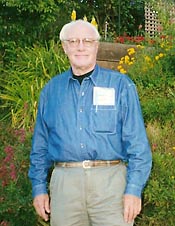UC Berkeley Press Release
Richard Bridgman, dies at age 77
BERKELEY – Richard M. Bridgman, an emeritus professor of English at the University of California, Berkeley, for 25 years and an accomplished author, died of cancer at his Oakland hills home on Jan. 17. He was 77.
 Richard Bridgman |
Bridgman's most notable books featured unconventional explorations of the styles of such American favorites as Mark Twain, Henry David Thoreau and Gertrude Stein. He authored "Colloquial Style in America" (1966), "Gertrude Stein in Pieces" (1970), "Dark Thoreau" (1982) and "Traveling in Mark Twain" (1987).
In his book about Twain, Bridgman wrote, "Perpetual movement seemed the answer to the precariousness of life. He (Twain) moved to keep from sinking." In "Dark Thoreau," he described Thoreau as "a tormented and sometimes quite savage man, whose prose can be variously bizarre, ugly and opaque, although such moments are customarily ignored discreetly, since they fail to illustrate the affirmative individualist and priest of Nature."
During his academic career, Bridgman was named a Woodrow Wilson Fellow (1957-1960) and a Guggenheim Fellow (1968-1969). He received the UC Berkeley English Department's top award when he was chosen to deliver the Charles Mills Gayley Lecture in 1977. He earned the campus's highest honor, the Berkeley Citation, upon his retirement in 1989.
Anne Middleton, UC Berkeley's Florence Green Bixby Professor of English, was English department chair when she nominated Bridgman for the Berkeley Citation. In her nomination letter, Middleton commended Bridgman for his keen interest and expertise in "the difficult literary terrain in which divergent styles, languages and implicit literary assumptions clash, and re-form themselves in the encounter into provocative new configurations."
She added in her letter that Bridgman's strength as a teacher drew from his character as "he detests mere intellectual fashion, insists on hard work and on wide and deep reading, and rewards independent thinking, even where it diverges markedly from his own inclinations as a critic."
Longtime colleague Stephen Booth, a professor of English at UC Berkeley, remembered Bridgman's Gayley Lecture. "Lectures about 18th century verse normally don't make my hands tremble," Booth said. "But this one did. He gave the best single lecture I've ever heard. Absolutely stunning, just dazzling."
Booth called Bridgman "a gentle, sweet man with a steel backbone."
Born in Toledo, Ohio, in 1927, Bridgman enlisted in the Navy after graduating from high school at the end of World War II. He later joined the Merchant Marines and worked on an oil tanker in South America and the Caribbean before taking up with other young American expatriates in France.
It was while in France, said Bridgman's son Roy, that his father began to develop his love of literature, art and culture.
Bridgman returned to the United States and worked briefly as a reporter at the Toledo Blade, covering the Toledo Mudhens baseball team. Then he moved to New York, where he met and married Denise King.
The pair moved to California, where he attended UC Berkeley, studying under Henry Nash Smith, a professor of English and for several years editor of The Bancroft Library's Mark Twain Papers. Bridgman earned his B.A. in 1956, his M.A. in 1957 and his Ph.D. in 1960 -- all in English. He taught American and English literature at Dartmouth College in New Hampshire for two years before returning to teach at UC Berkeley until 1989.
Bridgman served stints as a visiting scholar at the University of Copenhagen in 1965, and in 1973 was chosen visiting chair at Moscow State University, where he as one of the first Americans to teach during the Cold War.
His students' reading list included Thoreau, Edgar Allen Poe, Herman Melville, Nathaniel Hawthorne, Ralph Waldo Emerson, Walt Whitman and James Fenimore Cooper. On his return to the United States, he told a Washington Post reporter that students in his weekly seminar in Moscow were particularly interested in Norman Mailer, Kurt Vonnegut and Joyce Carol Oates. He met his second wife, Elena, in Moscow.
In the mid-1970s at UC Berkeley, Bridgman was chair of the Mark Twain Project at The Bancroft Library, and he served on numerous campus committees advising on topics such as the library, creative arts and the budget.
Bridgman was a member of the Modern Language Association and was named to its James Russell Lowell Prize Committee, which reviews books for the association's highest annual award. He also belonged to the Thoreau Society.
His son, Roy, recalled his father typically read several books simultaneously and loved public libraries and used book shops. Bridgman also was an avid gardener and traveler.
Roy Bridgman noted that his father staunchly refused to use a computer, except in libraries without card catalogs. Even after his father lost his manual typewriter in the 1991 Oakland Hills fire, he acquired a replacement from antiquated equipment about to be scrapped by the English Department. "He rebuilt his house overlooking Claremont Canyon and used that typewriter for the rest of his life," said Roy.
His survivors include a daughter, Cynthia Josayma of Berkeley, sons, Joel Bridgman of Berkeley and Roy Bridgman of Sonora, as well as two grandchildren.
A memorial service was held today (Thursday, Feb. 17) at UC Berkeley's Faculty Club from 4-6 p.m.

